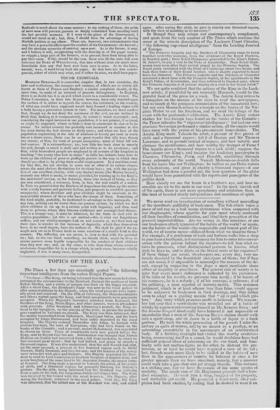TOPICS OF THE DAY.
The Times a few days ago sneeringly quoted "the following important intelligence from the native Bengal Papers.
" Lucknow .—The King, on being informed that the new moon had risen, intimated the circumstance to the Resident, through the medium of linen Buksh Mirdha, and a salute of cannon was fired on the happy occasion. After a short time, the Resident's Nazir was sent to the royal palace to offer congratulations to his Majesty, when the visual presents were mutually given and received. On the 17th of February, the Moorsheedzadalis and others waited upon the King, and their compliments were graciously accepted. When his Majesty'sbSouwaree returned from Kokurail, the brothers of the King, Mirza Hajee, and other Ameers, were in attendance with presents. After breakfast, and witnessing a nautch, the King retired to the bungalow, on the margin of the river, to peruse the newspapers supplied by Yatimad-oo-doulaie The King was then informed, that the money transmitted from Buhuraich, Manikpoor bahar, and the lands occupied by Khaja Mallen-nu:lid, had been safely deposited in the royal treasury. His Majesty ordered Moozuffur Ally Khan, to furnish with clothes two boys, the sons of Europeans, who had been found on the banks of the Goomtie ; and a servant, named Mahommud, was appointed to attend on them. Trays of sweetmeats were now placed before the King, sent by Beebum Gee-tee-ara. Information was btoueht that Nuwab Mohsun-oo-doulah had recovered from a fall from his horse, by which he had received great injury ; that he had bathed, and given in charity a thousand rupees. It was also understood, that the said Nuwab had sent, on the same account, a present of five hundred rupees each to Mulki Dooran, Mulki Zoomani, and Gee-tee-ara ; and the bearers of the money were rewarded with gifts and lehiJaats. His Majesty requested the Resident to send to Lord Combermere fourteen banghies of English fruit, and seven banghies of the same kind to Mr. Augustus Brooke, the senior Judge at Benares. The King made a present to Yakoob, the artist, of five pieces of cloth, and a thousand rupees, for promptly finishing his Majesty's picture. On the 20th, being informed that the Resident was suffering from a pain in his foot, the King immediately called upon him. The King was received by the Guard with the usual honours. His Majesty, after seeing the Resident, returned to the royal palace. Next day, the King was informed, that the infant son of the Resident was sick, and called again. After seeing the child, he gave in charity one thousand rupees, with the view of assisting in its recovery."
In Bengal they may return our contemporary's compliment, and quote from the very number of The Tinter which contains the sneer at the minute description of the Lucknow Court Circular, "the following important intelligence" from the Leading Journal of Europe.
"The Princess Augusta and the Duchess of Gloucester came to town together yesterday morning, from the residence of the Royal Duchess, in Bagshot-pare ; their Royal Highnesses proceeded to the King's Palace, St. James's, to pay a visit to the Duke of Cambridge. Their Royal Highnesses were soon after their arrival joined by the Princess Sophia. The Royal party remained with the Duke of Cambridge about two hours, and took their leave of their Royal brother, who is shortly expected to leave town for Hanover. The Princess Augusta and the Duchess of Glocester remained a short time with the Princess Sophia, at her apartments in the King's Palace, at Kensington, and then returned to Bagshot-park, where the Princess Augusta is at present staying on a visit to her Royal sister."
We are quite confident that the actions of the King in the Lucknow article, if paralleled by our venerable Monarch, would be the grateful food of the press for a week. The Asiatic King retires to a bungalow on the margin of the river to read the newspapers, and we laugh at the pompons annunciation of the immaterial fact ; but our own Monarch retires to a temple on the banks of the Virginia Water to eat his luncheon, and we read the tidings of the event with the profoundest edification. The Asiatic King, orders clothes for two foreign boys found on the banks of the Goomtie ; the Times ridicules the "important intelligence ." but had our own gracious Sovereign performed a similar action, all the empire would have rung with the praise of his pre-eminent benevolence. The Asiatic King made Yakoob the artist, a present of five pieces of cloth and a thousand rupees ; tell it of George and Sir Thomas Lawrence, and in pounds instead of rupees, and how notable and olorious the munificence, and how worthy the trumpet of Fame ! The Asiatic gives a thousand rupees to a sick child ; suppose the benevolence our King's, and imagine the laudatory paragraphs in Couriers, Chronicles, Post:, an (1 Heralds, circulating through every extremity of the world. Nuwab Mohsun-oo-doulah falls from his horse like our Wellington; he bathes as our Duke waters at Cheltenham, and gives in charity a thousand rupees—if our Wellington had done a parallel act, the four quarters of the globe would have been penetrated with the reports and panegyrics of the godlike deed.
How clearly we see the beam in a brother's eye, and how insensible are we to the mote in our own! In the most slavish soil of the earth, there is not more sycophancy and adulation than in this land of boasted sturdy independence and manliness of spirit.


















 Previous page
Previous page